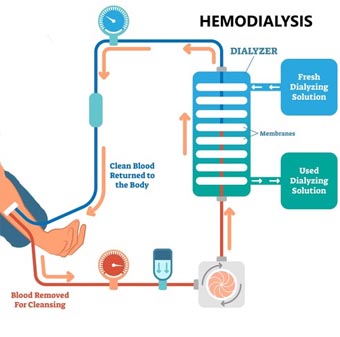

Hemodialysis is the process of filtering blood through a dialysis machine and removing accumulated toxins and extra water from the body ie When the natural machines of the body- kidneys fails, then artificial machines are used to clean the blood and body.
Hemodialysis may be requires in few cases of acute renal failure where the dialysis is temporary and patient is taken off hemodialysis once his kidney function improves. In Chronic kidney disease ,the dialysis will be instituted only in advanced stage 5 , where the HD will be life long or till he gets kidney transplant done.
How Does Hemodialysis Work?
A dialyser (artificial kidney) purifies blood by passing it through a filter. Dialysers work by allowing blood to flow along one side of a semipermeable membrane made of cellulose or another similar material. Dialysate flows along the other side. The dialysate fluid contains a limited amount of minerals normally found in the blood at safe levels. There is an overabundance of them in renal failure. As a result of the membrane having holes of different sizes, the excess fluid and substances in the blood are able to pass through dialysate. As a result, the blood is effectively cleaned. The elimination of toxic waste products from the body is accomplished at different rates, with small molecules such as potassium being removed rapidly. However, molecules that are larger are eliminated more slowly, until they are no more a threat to the body.
What are the Different Kinds of Hemodialysis?
Hemodialysis can be of different kinds. The type of hemodialysis that the patient needs is determined by the doctor.
In-center hemodialysis
This is conducted in a hospital or a dialysis center. It takes approximately three to five hours a day, and is usually done three days a week.
Home hemodialysis
This is conducted in a hospital or a dialysis center. It takes approximately three to five hours a day, and is usually done three days a week.
Daily home hemodialysis
When the patient is adequately trained to conduct the hemodialysis treatments at home, it can be conducted on a daily basis for about three hours.
Nocturnal home hemodialysis
This can be done three to seven nights a week at home. The sessions are done overnight for six to eight hours.
If you or a loved one requires Haemodialysis, you can reach out to Dr Satinder Pal Aggarwal for a consultation.
